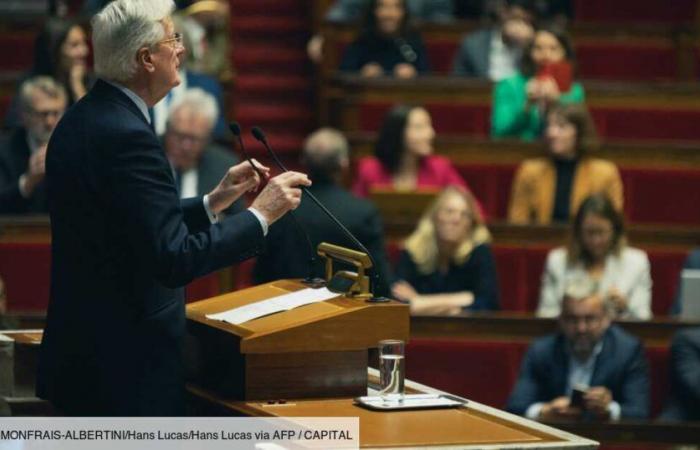© EDOUARD MONFRAIS-ALBERTINI/Hans Lucas/Hans Lucas via AFP
– Michel Barnier announced Monday December 2 the use of article 49.3 of the Constitution.
What will happen to the Barnier government? Will it become the shortest in the history of the Fifth Republic? Monday December 2, the Prime Minister activated the 49.3 on the Social Security financing bill. The article of the Constitution allows a text to be adopted without a vote by the National Assembly. On the other hand, it engages the responsibility of the government which, more than ever, risks falling after the vote of a motion of censure.
“The fall of Barnier is recorded”declared Mathilde Panot, head of the parliamentary group La France insoumise (LFI) as she left the National Assembly. The left-wing alliance, the New Popular Front (NFP) tabled a motion of censure a few hours after Michel Barnier’s poker move. According to the Constitution, deputies have 24 hours to submit a motion of censure. For it to be validated, the latter must obtain the signature of one tenth of the members of the Assembly.
Budget 2025: will “pensions really no longer be paid” in the event of a motion of censure?
A weakened government facing two motions of censure
The National gathering (RN) is not to be outdone: the party with the flame has also tabled a motion of censure against the government after having left the suspense hanging for several days. The two motions of censure will be debated on Wednesday December 4 at 4 p.m. The one with the most signatures, that of the NFP, will be voted on first. The RN affirmed that it will vote on all the motions, “wherever they come from”indicated Marine Le Pen leaving the National Assembly.
For a motion of censure to be adopted, it must receive an absolute majority of the members of the National Assembly, i.e. 288 votes, due to the absence of two deputies out of the 577 seats in the chamber. The RN totals 140 members taking into account Eric Ciotti’s 16 allies. As for the NFP, if we add the Socialist Party (66), the Ecologists (38), LFI (71) and GDR (17), we obtain 192 votes. Mathematically, Michel Barnier therefore has a good chance of falling.
Will Michel Barnier soon have to submit his resignation to Emmanuel Macron?
If the motion of censure is adopted, the Social Security budget text is rejected and the Prime Minister must resign to Emmanuel Macron, currently on a state visit to Saudi Arabia. The President of the Republic must then appoint a new minister in order to form a new government. But the process could be long given that the Constitution does not provide for any deadline. As a reminder, Michel Barnier was appointed on September 5, almost two months after the resignation of Gabriel Attal on July 16, 2024.
The only precedent in the history of the Fifth Republic dates from 1962. The Pompidou government was overthrown via a so-called “spontaneous” motion of censure – at the initiative of the deputies. “Charles De Gaulle then refused his resignation and immediately dissolved the National Assembly. The general wins the early legislative elections and reappoints Pompidou as Prime Minister.told Guillaume Tusseau, constitutionalist and political scientist Capital. As a reminder, the National Assembly cannot be dissolved before July 2025, that is to say one year after the last one.
What happens to the 2025 budget?
Regarding the 2025 budget, for the moment the examination continues. The Senate must continue to debate the state budget on Tuesday. In the morning, the joint committee reached an agreement on the budget of “end of management” for 2024. If Michel Barnier’s government falls, several remedies exist so that France does not find itself without a budget.
The organic law relating to finance laws (LOLF) gives the possibility of presenting before Parliament «a special bill authorizing it to continue to collect existing taxes. “We can assume that elected officials will be keen to ensure the continuity of national life since, in this case, there is no question of distribution of revenue or expenditure”analyzed last week for CapitalStéphanie Damarey, professor of public financial law. Once this special law has been published in the Official Journal, the government can take «decrees opening the appropriations applicable only to voted services», specifies the LOLF. This is the “minimum appropriations that the government considers essential to continue the execution of public services under the conditions which were approved the previous year by Parliament”.
The LOLF also gives the government the possibility of voting a partial law on the first part of the finance bill, i.e. revenue. “The second part, relating to expenditure, can be adopted later, in January or even February”the expert told us. Finally, the Constitution gives the possibility of “adopt its finance bill in whole or in part by prescription». This option has never been used under the Fifth Republic.






